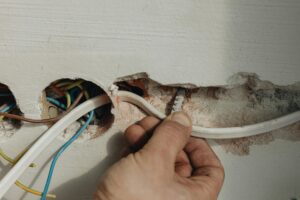OpoticWise – The Tenant Tech Gap
Why CRE Portfolios Fall Behind Without Digital Ownership
Introduction
Welcome back to the second week of sour 52-week series on digital transformation in commercial real estate. I’m Bill Douglas, CEO of OpticWise, where we help CRE owners transform their buildings into smart, revenue-generating platforms by reclaiming control of their data and digital infrastructures. (Bill Douglas CEO of OpticWise pictured below).

These insights are grounded in my book, Peak Property Performance: Game-Changing AI and Digital Strategies for Commercial Real Estate (Fast Company Press, June 2025), which offers a practical, jargon-free roadmap that empowers readers to reclaim digital ownership, maximize NOI, leverage AI, and future-proof their assets in an increasingly competitive landscape.
Let’s explore one of the most overlooked threats to CRE portfolios today: the growing technology gap between what tenants expect and what buildings deliver.
The Problem: Lost Control, Lost Value
Too many property owners have delegated digital decisions to third parties—ISPs, integrators, or outsourced tech vendors. While initially convenient, this comes at a cost:
– Loss of control over building data
– Fragmented systems that can’t interoperate
– Missed monetization opportunities for digital services
– Delays in resolving system and network issues effecting employees and tenants
As a result, CRE portfolios become digitally stagnant while tenant expectations race ahead.
The Modern Tenant Profile
Today’s tenants—whether remote teams, high-tech startups, or hybrid firms—expect their spaces to:
– Deliver fast, secure, private internet with no IT headaches
– Support both private and shared networks controlled by tenant firms
– Integrate with apps and IoT-enabled services
– Reduce surprise costs and service delays
- Increased service offerings and reduce expenses
When buildings fall short, tenants seek alternatives. The gap between demand and delivery becomes a lease risk.
Andrew Stanton CEO Proptech-PR
Why Electrical and Gas reports for rentals are a top priority
What being a compliant Landlord looks like
If you’re a landlord in the UK and you fail to have a valid Electrical Installation Condition Report (EICR) for your rental property, the consequences can be serious—both legally and financially and of course can cause accidents or lead to the death of a tenant.
Legal Requirements – since 1 July 2020 (for new tenancies) and 1 April 2021 (for existing tenancies), landlords in England are legally required to: have a valid EICR carried out at least every 5 years. Provide a copy of the report to New tenants before they move in. Existing tenants within 28 days of the inspection; and the local authority within 7 days if requested.
Consequences of Non-Compliance
Financial Penalties – Local authorities can impose fines of up to £30,000 per breach if the property does not have a valid EICR. Councils can serve enforcement notices requiring landlords to complete necessary remedial work within 28 days—or sooner if the issue is serious. If the landlord fails to comply, the council can arrange the work themselves and recover the costs from the landlord.
Increased Legal Liability – If a tenant or visitor is injured due to an electrical fault, and there’s no EICR to prove due diligence, you could face civil lawsuits or even criminal prosecution.
Eviction Limitations – Many Landlords are unaware that in some cases, failure to comply with electrical safety regulations could affect your ability to serve a Section 21 notice to evict tenants.
Invalid Insurance – Landlord insurance policies require proof of regular safety checks. An invalid or missing EICR may void your insurance coverage.

Human consequence – faulty electrics cause accidents, fires and can result in fatalities. So not having an up-to-date EICR as a UK landlord can expose you to heavy fines, enforcement action, insurance issues, and legal risk. As well as gambling with the welfare of the tenants who live in the rental. Staying compliant is not just a legal obligation—it’s also a key part of protecting your investment and your tenants.
Andrew Stanton CEO Proptech-PR
InventoryBase asks will AI replace inventory professionals?
Artificial Intelligence & inventory clerks – what is the future?
Earlier this month Sian Metcalfe Operations controller at InventoryBase a top voice in the PRS and sector did a webinar with Daniel Evans from AIIC (Association of Independent Inventory Clerks). The discussion was provocatively called ‘ Will AI replace inventory professionals – or unlock their true potential?’ Now I missed the event so have no idea what was covered on the day – but I am sure it unpacked a lot of great content as it was built up with the following teaser ,
‘As artificial intelligence becomes more embedded in property technology, inventory professionals are facing big questions about their roles, relevance, and future value. This webinar will unpack the realities behind the hype, explore how AI is already changing the way reports are compiled and delivered, and explain why human expertise is still the most critical asset in the process.
Why should you attend? – Discover how AI is transforming inventory report workflows – Understand what today’s clerks and suppliers need to know – Learn why your expertise matters more than ever. Whether you compile reports daily or manage teams who do, this is one conversation you won’t want to miss’.

Having missed all of the wisdom of that webinar, but increasingly in my day job dealing with founders utilising AI in the services they are building out, and of course with the AI revolution seeming to be encroaching in to all our lives so I thought I would give my own views on what possibel impact AI is having in the inspection of property assets sector.
In UK lettings, inventory clerks play a crucial role in protecting landlords, tenants, and property managers alike. By documenting the condition of rental properties at check-in and check-out, they provide the foundation for fair deposit returns and help resolve disputes. But as artificial intelligence and automation technologies become more sophisticated, a pressing question arises how will AI feed into this nexus replace inventory clerks – or will it simply change the way they work for the better?
The Role of the Inventory Clerk
Inventory clerks are responsible for producing detailed reports that outline the state of a property before and after a tenancy. This includes descriptions of furnishings, fixtures, cleanliness, and any wear and tear, often supported by hundreds of photos. Their work demands attention to detail, strong communication skills, and impartiality – all of which are essential in the event of a dispute.
Andrew Stanton CEO Proptech-PR
Andrew Stanton Founder & Editor of 'PROPTECH-X' where his insights, connections, analysis and commentary on proptech and real estate are based on writing 1.3M words annually. Plus meeting 1,000 Proptech founders, critiquing 400 decks and having had 130 clients as CEO of 'PROPTECH-PR', a consultancy for Proptech founders seeking growth and exit strategies. He also acts as an advisory for major global real estate companies on sales, acquisitions, market positioning & operations. With 200K followers & readers, he is the 'Proptech Realestate Influencer.'












